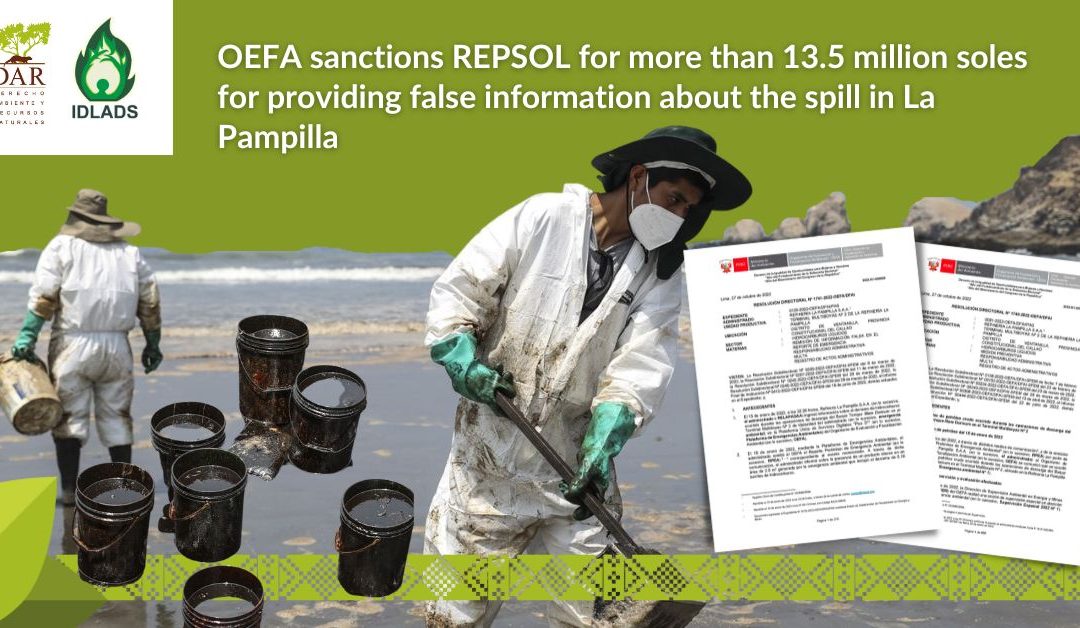Lima, October 31th, 2022.- More than 9 months after the spills that occurred in the Peruvian sea caused by Refinería La Pampilla S.A.A.-under the administration of Repsol del Perú S.A.C- the Agency for Environmental Assessment and Enforcement (OEFA) imposed a fine of 3000 UIT (S/ 13,800,000.00), approximately US$ 3.4 millions, according to Directorial Resolution No. 1741-2022-OEFA / DFAI, issued this Thursday.
According to this Resolution, the sanction (in the first administrative instance) originates from the fact that Repsol included false information in its Preliminary Report of Environmental Emergencies in the Single Platform of Digital Services of the OEFA – PLUSD. This information refers to the calculation of the volume of crude oil spilled as a result of said event; and to the reported period of the environmental emergency that occurred on January 15th, 2022 at the Multiboyas Terminal No. 2.
Regarding the fine, Vanessa Cueto, vice president of DAR maintains: “How can an environmental emergency be adequately resolved without having real data on what happened. Transparency in information, especially in events as sensitive as an oil spill whose impact extends over time for the ecosystem and the local population, is the first pillar that allows rapid and adequate action to be taken in accordance with the characteristics of the emergency”.
To avoid a greater severity of impacts based on the transparency of truthful and timely information in the extractive sector, it’s necessary to present public reports on the quality of water resources, flora, fauna, water quality, hydrobiological resources and human health after the spill in La Pampilla. In this regard, it had previously warned the deficiencies in terms of transparency and access to socio-environmental information regarding this spill.
And at a general level, the promotion and compliance with the best international practices that expand the transparency of environmental information in the extractive sector must continue, such as that carried out by the Extractive Industries Transparency Initiative (EITI), therefore the companies that participate in this initiative should comply with the highest environmental and social standards, as well as demonstrate their real commitment to transparency, which the Repsol company is not complying with.
In this regard, it should be noted that in the months of March and June, civil society sent letters addressed to the EITI senior management expressing their concern over Repsol’s lack of transparency in relation to this spill. In this context, in the last formal communication in June, it was requested that Repsol be sanctioned, as well as that its participation and withdrawal from said initiative be reevaluated, given that it would have violated the EITI Principles and Code of Ethics, and, therefore, the “Expectations of companies that support the EITI”.
Sanctions continue
OEFA has also sanctioned Repsol this week for more than 29 million Soles (6,340,082 UIT, equivalent to S/29,164,377.2) as established in RD No. 1740-2022-OEFA/DFAI, due to failure to carry out the actions of cleaning the soil area affected by the crude oil spill in the Cavero beach area and rocky areas, as a result of the unloading operations at the Multibuoy Terminal No. 2 of the La Pampilla Refinery; and secure the area, carry out the containment and recovery of the supernatant hydrocarbon on the Salitral, La Puntilla and Club Naval beaches, product of the crude oil spill from the unloading operations at the Multibuoy Terminal No. 2 of La Pampilla Refinery.
Ensuring the completion of the remediation actions must be a priority, apart from the legal measures and administrative procedures that are being carried out to investigate the legal responsibilities of the company.
It should be noted that the aforementioned Resolutions are the result of sanctioning administrative procedures that accompany the affected fishermen and various civil society organizations, including the Institute for Legal Defense of the Environment and Sustainable Development Peru (IDLADS) under the role of «interested third parties”, with the support of Law, Environment and Natural Resources (DAR).


